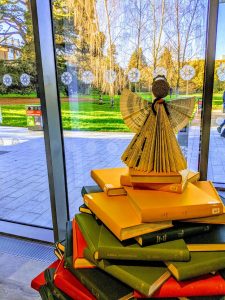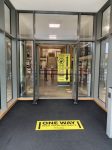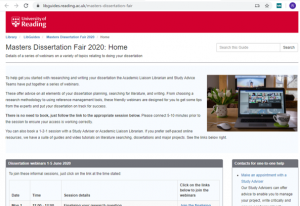
Be like our book angel and stay on top of your library books this Christmas!
Whether you’re heading home soon or staying on campus over the vacation, this summary of available Library services can help you plan ahead. We wish you happy holidays and effective studying – stay safe everyone!
Library opening
Term ends on Friday 11 December, so after this date the Library will be operating reduced opening hours. This will affect the times that you are able to book study space, Click & Collect loans, book IT Service Desk appointments and use the Library Cafe.
From Saturday 12 December till Monday 21 December, the Library will be open from 08:30 to early evening on weekdays only. There are no weekend services available.
Along with the rest of the campus, the Library closes completely on Tuesday 22 December until Sunday 3 January for the University Christmas closure.
From Monday 4 January till Friday 8 January, we resume vacation-hours opening, and from Saturday 9 January we’ll be open for term-time hours again.
Borrow until January 2021
To help borrowers heading home early due to UK government guidance, we’re lending everything to all Library members until Tuesday 12 January. Any items borrowed or renewed from Monday 30 November will issue until 12 January. These vacation loans include standard, 7-day, overnight loans and journals.
Store and Closed Access requests
If you need materials from the off-site Store or from our Closed Access shelves, be aware of the final dates of collection and make sure you place your request in time.
- Store collections finish for Christmas on Thursday 17 December – get your request in before 08:30 on this day.
- Closed Access collections will finish for Christmas on Friday 18 December – get your request in before 13:45.
We will next collect from Closed Access on 4 January and from Store on 7 January (these dates might be subject to change if there is a shortage of available staff). For more information, see Requesting items from Store and Closed Access.
Online help
All our expert staff are available online to help and advise you throughout the vacation (except during the Christmas closure period).
If you have a general enquiry, email library@reading.ac.uk or phone 0118 378 8770.
More info
Check our Current Library Services guide for up-to-date information, especially if there are changes to current government guidelines.
Library User Services







 If you are planning your Masters dissertation, or you are heading into your final year this Autumn and your thoughts are starting to turn to topics for your dissertation, you might be interested to take a look at our
If you are planning your Masters dissertation, or you are heading into your final year this Autumn and your thoughts are starting to turn to topics for your dissertation, you might be interested to take a look at our  It’s February which means if you’re a final year student, you’re probably frantically trying to complete your dissertation. Over the past few weeks, the
It’s February which means if you’re a final year student, you’re probably frantically trying to complete your dissertation. Over the past few weeks, the 


 There are still places available on our final reference management system workshops for EndNote and Mendeley this term. These will take place online via Blackboard Collaborate.
There are still places available on our final reference management system workshops for EndNote and Mendeley this term. These will take place online via Blackboard Collaborate. To support students temporarily unable to access their library’s print holdings during the Covid-19 situation, several publishers have responded by temporarily making certain resources free or extending access over the next few months. We’ve been signing up to many of these offers to provide you with extra material, in addition to our usual e-resources.
To support students temporarily unable to access their library’s print holdings during the Covid-19 situation, several publishers have responded by temporarily making certain resources free or extending access over the next few months. We’ve been signing up to many of these offers to provide you with extra material, in addition to our usual e-resources. Studying at home requires self-discipline, organisation and effective time management strategies. Follow our Study Advice top 5 tips to make the most of your study time at home.
Studying at home requires self-discipline, organisation and effective time management strategies. Follow our Study Advice top 5 tips to make the most of your study time at home.